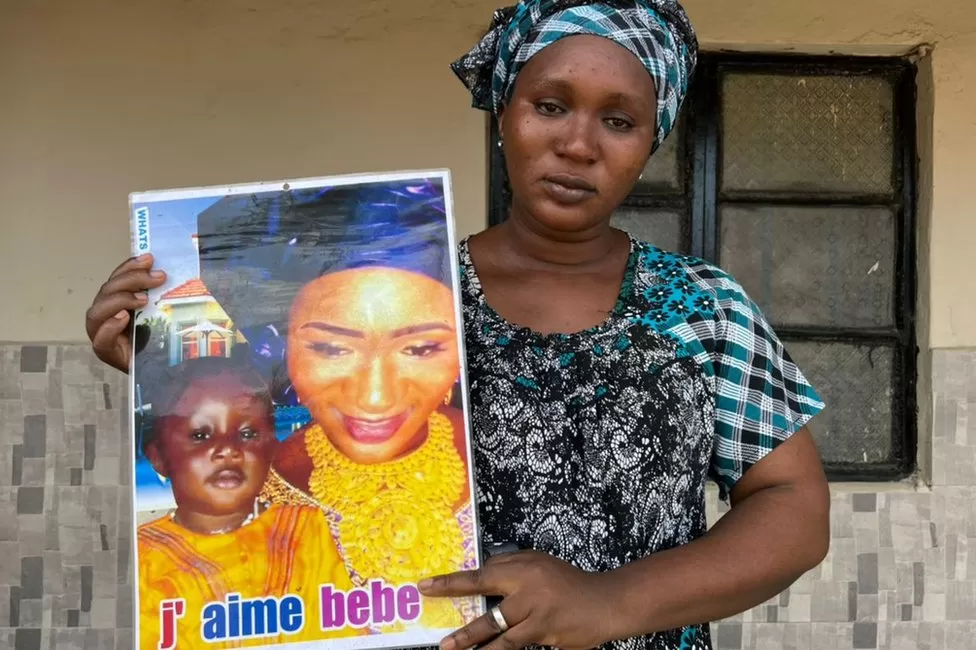A red toy motorbike sits in the corner of Mariam Kuyateh’s home gathering dust.
Sponsored Images




It was meant for her 20-month-old son, Musa, but he passed away in September.
He is one of the 66 children in The Gambia who are thought to have died after being given a cough syrup that had been “potentially linked with acute kidney injuries”, according to the World Health Organization.
No-one in the family touches Musa’s toy – a reminder of what has been lost.
His 30-year-old mother, who has four other children, was in tears remembering what had happened to her son.
Sitting in her home in a suburb of The Gambia’s largest city, Serrekunda, she explained that his sickness started as a flu. After he was seen by a doctor, her husband bought a syrup to treat the problem.

When we gave him the syrup, the flu stopped, but it led to another problem,” Ms Kuyateh said.
“My son was not passing urine.”
She returned to the hospital and Musa was sent for a blood test, which ruled out malaria. He was given another treatment, which did not work, and then a catheter was fitted, but he did not pass urine.
Finally, the small child was operated on. There was no improvement.
“He couldn’t make it, he died.”
66 children have died in Gambia so far
Earlier this week, the WHO issued a global alert over four cough syrups in connection with the deaths in The Gambia.
The products – Promethazine Oral Solution, Kofexmalin Baby Cough Syrup, Makoff Baby Cough Syrup and Magrip N Cold Syrup – were manufactured by an Indian company, Maiden Pharmaceuticals, which had failed to provide guarantees about their safety, the WHO said.
The Indian government is investigating the situation. The firm has not responded to a BBC request for comment.
There is a lot of anger in The Gambia over what has happened.
There are growing calls for the resignation of Health Minister Dr Ahmadou Lamin Samateh, along with the prosecution of the importers of the drugs into the country.
“Sixty-six is a huge number. So we need justice, because the victims were innocent children,” Ms Kuyateh said.
The Indian government has ordered an investigation into four cough syrups after the World Health Organization (WHO) linked them to the deaths of 66 children in The Gambia.
The WHO said the children had died of kidney injuries. It said it found “unacceptable” levels of toxins in the syrups made by Maiden Pharmaceuticals.
It also advised regulators to stop sale of the products.
Maiden Pharmaceuticals has not yet commented.
The BBC has contacted the company for comment.
India’s national drug regulator began investigating after the WHO contacted it on 29 September, an Indian government statement said.
The regulator has also asked the WHO to share its report establishing the “causal relation to death with the medical products in question”, the statement added.
The WHO findings, announced by Director-General Tedros Adhanom Ghebreyesus on Wednesday, came after samples of each of the four cough syrups were tested. It identified the medicines as Promethazine Oral Solution, Kofexmalin Baby Cough Syrup, Makoff Baby Cough Syrup and Magrip N Cold Syrup.
The health body said that laboratory analysis had confirmed that the syrups contained unacceptable amounts of diethylene glycol and ethylene glycol, which were toxic to humans and could prove fatal when consumed.
The WHO said that so far, the products have been identified in The Gambia, but that they may have been distributed to other countries through informal markets.
The Indian government, however, said it had exported these cough syrups “only to The Gambia so far”.
The health body said it was “conducting further investigation” with the firm and Indian authorities.
“All batches of these products should be considered unsafe until they can be analysed by the relevant National Regulatory Authorities,” it added.
India produces a third of the world’s medicines, mostly in the form of generic drugs.
Home to some of the fastest growing pharmaceutical companies, the country is known as the “world’s pharmacy” and meets much of the medical needs of African nations.
Maiden Pharmaceuticals, which is based in the northern state of Haryana, exports its products to countries in Asia, Africa and Latin America, according to Reuters.
Medical officers in The Gambia first raised the alarm in July after dozens of children were diagnosed with serious kidney problems.
The Gambia’s director of health services, Mustapha Bittaye, told Reuters that the number of deaths had gone down in recent weeks and that the country had banned the sale of the products.
“However, until recently, some of the syrups were still being sold in private clinics and in hospitals,” he was quoted as saying.
Dear Readers, Good and credible news reportage is tedious task and requires huge finances.
We are soliciting your Noble support for as low as N1,000 your support would go a long way in assisting us to continue to guarantee our readers quality news.
Bank transfers can be made to:
Account Name: Harvest and Commercial
Bank: Sterling Bank
Account Number: 0078627735